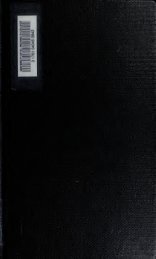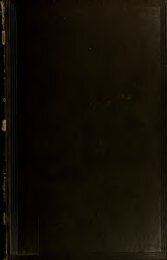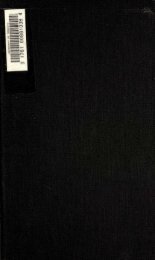Texts from the Buddhist canon : commonly known as Dhammapada
Texts from the Buddhist canon : commonly known as Dhammapada
Texts from the Buddhist canon : commonly known as Dhammapada
You also want an ePaper? Increase the reach of your titles
YUMPU automatically turns print PDFs into web optimized ePapers that Google loves.
( 84 ).<br />
SECTION XVI.<br />
THE THOUSANDS (SAHASSAVAGGO).<br />
I. In old time, when Buddha w<strong>as</strong> residing at Sriv<strong>as</strong>tl, <strong>the</strong>re<br />
w<strong>as</strong> an old mendicant called Pan-teh-san (Patisena ?)<br />
who being by nature cross and dull, could not learn so<br />
much <strong>as</strong> one GtlthS. by heart. Buddha accordingly ordered<br />
Soo Eahats day by day to instruct him, but after three<br />
years he still w<strong>as</strong> unable to remember even <strong>the</strong> one G§.th§,.<br />
Then all <strong>the</strong> people of <strong>the</strong> country (<strong>the</strong> four orders of<br />
people) knowing his ignorance, began to ridicule him, on<br />
which Buddha, pitying his c<strong>as</strong>e, called him to his side, and<br />
gently repeated <strong>the</strong> following stanza :— " He who guards his<br />
mouth, and restrains his thoughts, he who offends not with<br />
his body, <strong>the</strong> man who acts thus shall obtain deliverance."<br />
Then Patisena, moved by a sense of <strong>the</strong> M<strong>as</strong>ter's goodness<br />
to him, felt his heart opened, and at once he repeated <strong>the</strong><br />
stanza. Buddha <strong>the</strong>n addressed him fur<strong>the</strong>r— " You now,<br />
an old man, can repeat a stanza only, and men know this,<br />
and <strong>the</strong>y will still ridicule you, <strong>the</strong>refore I wiU now<br />
explain <strong>the</strong> meaning of <strong>the</strong> verse to you, and do you on<br />
your part attentively listen."<br />
Then Buddha declared <strong>the</strong> three causes connected with<br />
<strong>the</strong> body, <strong>the</strong> four connected with <strong>the</strong> mouth, and <strong>the</strong><br />
three connected with <strong>the</strong> thoughts, by destroying which<br />
men might obtain deliverance, on which <strong>the</strong> mendicant,<br />
ftilly realising <strong>the</strong> truth thus explained, obtained <strong>the</strong> con-<br />
dition of a Eahat. '<br />
Now, at this time <strong>the</strong>re were 500 Bhikshunls (Nuns)<br />
dwelling in <strong>the</strong>ir Vih§,ra, who sent one of <strong>the</strong>ir number to





